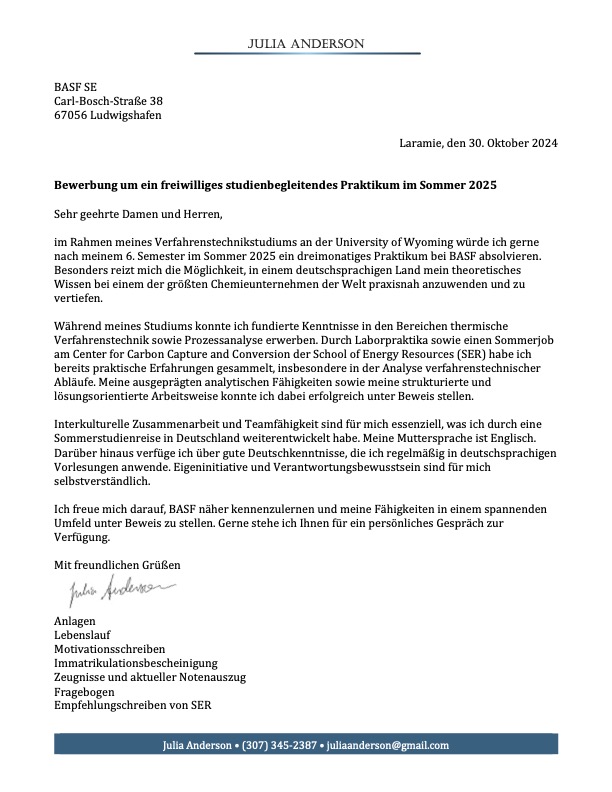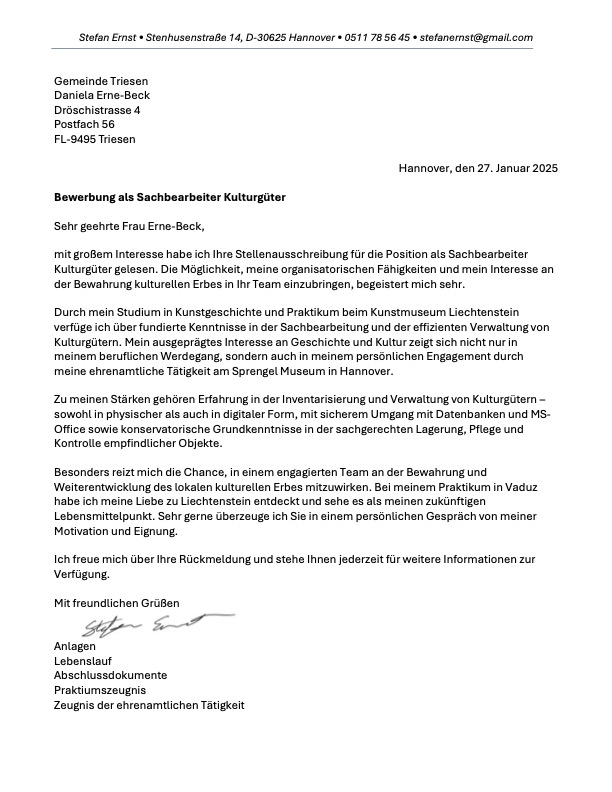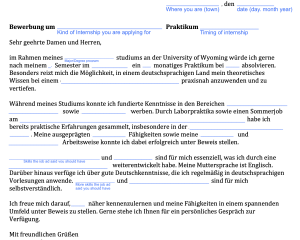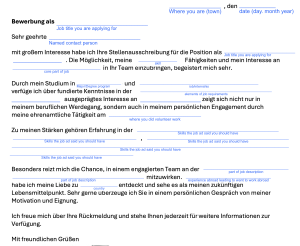2.5 Meine Bewerbung – das Bewerbungsschreiben

Lektionsüberblick
Now that you can write your Lebenslauf, you will want to be able to write the Bewerbungsschreiben in order to apply for the job. By the end of this lesson, you will be able to 1) identify documents required for the application process, 2) identify the key elements of a letter, and 3) identify formulaic language in a Bewerbungsschreiben in order to write such a letter based on a model.
1) Die Bewerbungsunterlagen
Similarly to submitting an application to a job in the United States, many documents are often required for positions in German-speaking countries. Practice reading and hearing the key documents in the flash cards below.
Let’s practice.
Kleiner Hinweis
Was ist der Unterschied zwischen ein Anschreiben und ein Motivationsschreiben? Das Bewerbungsschreiben (cover letter) focuses more on the qualifications and the job experience of the applicant and is a bit more formal, while das Motivationsschreiben (letter of motivation) highlights the applicant’s personal interests and motivation for applying for the job. The Motivationsschreiben is not always required; it often depends on the job and the competitiveness of the position being filled.
Jetzt bist du dran!
You have learned that applying for a job in a Germany-speaking country requires many documents. You can watch the following video to hear an overview of the various required (and optional) documents. What stands out to you the most about the documents required? Are there more or less documents required than for the average job application in the States? Imagine telling a friend of yours who knows nothing about finding a job in a German-speaking country about the application process. What important documents would you be sure to highlight?
2) Die Bestandteile eines Briefes
Let’s practice.
Jetzt bist du dran!
Look closely at the example letter above. What key features indicate that it is a formal letter? Write those features down in your written journal. When writing a formal letter, what phrase would you use as a salutation? Write that expression down now. How would you end the letter? What words or features are important when signing off? What other words of politeness do you notice in the examples above? Write those expressions in your written journal too.
3) Das Bewerbungsschreiben
Now that you can identify the main parts of a cover letter (or other official letter), let’s look at some of the formulaic language you can find in the cover letter. First, read through the following two letters. What similarities to do you see?
In your written journal, write out phrases that seem formulaic.
 |
 |
Now look at the letters again. The specific information pertaining to the internship/job have been removed as well as the applicants skills to reveal some typical, formulaic phrases for an application cover letter.
 |
 |
Jetzt bist du dran!
Look over your notes and compare with the two model letters. Which formulations do you particularly like? Which ones are hard to understand?
Jetzt kombininieren
In this lesson, you learned to 1) identify documents required for the application process, 2) identify the key elements of a letter, and 3) identify formulaic language in a Bewerbungsschreiben in order to write such a letter based on a model.
Now let’s put the process together writing a cover letter for your application.
- Look again at the position(s) you identify as potential good fits in the last lesson or find a new one on this job site.
- Compare Stefan Ernst’s letter with the ad for the position. Can you identify which parts of the letter were adapted from the ad?
- Using your notes and the cover letters above as your model, write a cover letter for your chosen position. You can take sentences from either letter adding details from your chosen job ad and details about yourself and your skills (present or future).

Media Attributions
- 2030-2040 fl banner large is licensed under a CC BY-NC-SA (Attribution NonCommercial ShareAlike) license
- bewerbungsschreiben julia anderson model
- bewerbungsschreiben Stefan Ernst model

